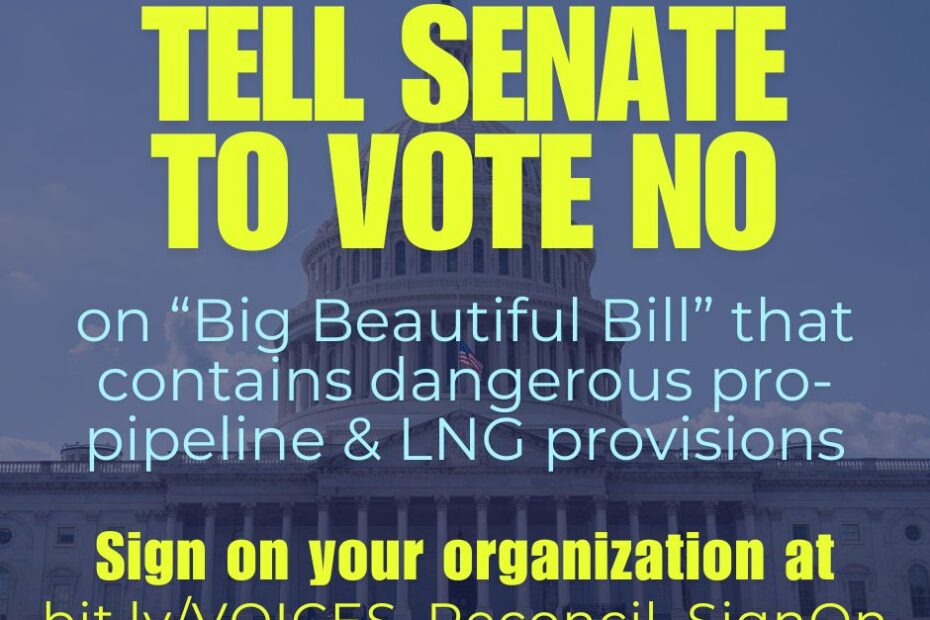Congress’s “Big Beautiful Bill” is nothing but Big, Bad, and Backwards for Pipeline Policy and Community Health & Safety
The budget bill before the U.S. Senate— dubbed the “One Big Beautiful Bill Act”— lays out plans for income tax breaks, increased border security and immigration application fees, and even funding cuts to Medicaid, food assistance, and children’s health insurance programs.
But did you know that deep within the bill, there are incredibly harmful pro-pipeline policies that undermine states’ rights and put our communities and environments at risk?
Section 41004 of the proposed “Big Beautiful Bill”:
- Allows pipeline companies to buy fast-tracked review of their permit applications if they pay $10 million or 1% of the expected cost of project construction (whichever is less);
- Strips away states’ rights by requiring state agencies, federal agencies, and interstate agencies to approve pipeline projects (and related infrastructure), only allowing the agencies to establish conditions to be met for pipeline construction and operation. The ability to reject a proposal is entirely eliminated;
- Regards projects as approved if regulatory agencies are unable to meet a prescribed one-year deadline for application review and the company refuses to agree to an extension of time;
- Only allows impacted property owners or communities to bring a challenge if they can demonstrate economic harm, completely disregarding the safety issues, health harms, and the environmental damages these projects inflict; and
- Raises the cost of a legal challenge for many communities by requiring all challenges be brought before the U.S. Court of Appeals for the D.C. Circuit, which imposes steep travel costs and legal/logistical barriers for communities outside of the DC metro area.
FERC-regulated pipelines and LNG infrastructure have ravaged communities by inflicting irreparable damage to our yards, farmlands, businesses, and precious community parks and preserved lands; by spewing pollution at levels that harm the health of our children, friends, and families; by bringing an ever-present threat of accidents, incidents, and explosions that have destroyed our sense of safety; and by degrading cherished environments that enrich lives and offer critical flooding and drinking water protections.

These dangerous provisions strip communities of their ability to protect their homes and businesses from fossil fuel development, and in turn denies them the ability to support and protect their children, their families, and themselves from unnecessary and unfair harm.
What can we do about it?
Our communities– which have already been scarred and damaged by FERC-regulated pipelines, compressor stations, and LNG facilities– deserve better!
Victory Over InFRACKStructure, Clean Energy InStead (VOICES)– a coalition of 250+ organizations founded and led by Delaware Riverkeeper Network– has written a letter urging Senators to vote NO on the “Big Beautiful Bill,” which contains devastating pro-pipeline provisions that would undermine states’ rights and property rights, perpetuate environmental and health harm on our communities, and create a Pay-to-Play scheme whereby big industry polluters can very literally buy the permits they desire.
We are asking organizations to sign on to the letter, so we may send the signed version to Senators that includes the total membership of all the individuals we represent. As more and more organizations sign on, the letter will be resubmitted to Senators to remind them of our presence and ever-growing people power!
SIGN ON YOUR ORGANIZATION TODAY AT: bit.ly/VOICES_Reconcil_SignOn
How did the “Big Beautiful Bill” come to be?
The “Big Beautiful Bill” is part of budget reconciliation, a process used by the United States Congress to pass federal spending, tax, and debt limit legislation with only a simple majority in the Senate (as opposed to the usual supermajority requirement of 60 votes). This process typically leads to a flurry of policies being compacted into one large omnibus bill, as seen in the “Big Beautiful Bill,” the Inflation Reduction Act, and COVID-19 Stimulus Package. The policies included in the bill can cover a wide range of topics such as tax cuts, clean energy investment, and prescription drug costs, and congress members will argue that such policies are in-line with federal budget directives. The House and the Senate are required to pass identical versions of this ‘reconciliation package’ before it can get signed into law. As such, the reconciliation process entails a lot of negotiation and deal-making between individual legislators and entire political parties.
On May 22, 2025, the U.S. House of Representatives passed their version of the reconciliation package in a narrow 215 – 214 vote. The bill is now in the hands of the Senate, where in order to get a majority vote, there will likely be lots of debate, amending, and arguments that certain provisions are extraneous and should be deleted. Treasury Secretary Scott Bessent stated that he hopes the reconciliation process will be completed by July 4, 2025– so we are expecting a lot of critical Senate discussion over the next month!

